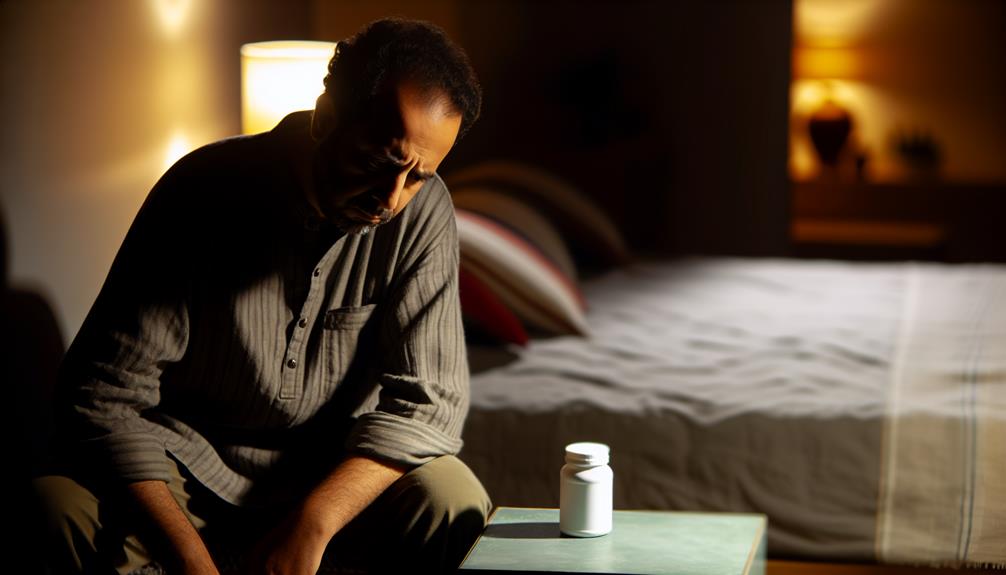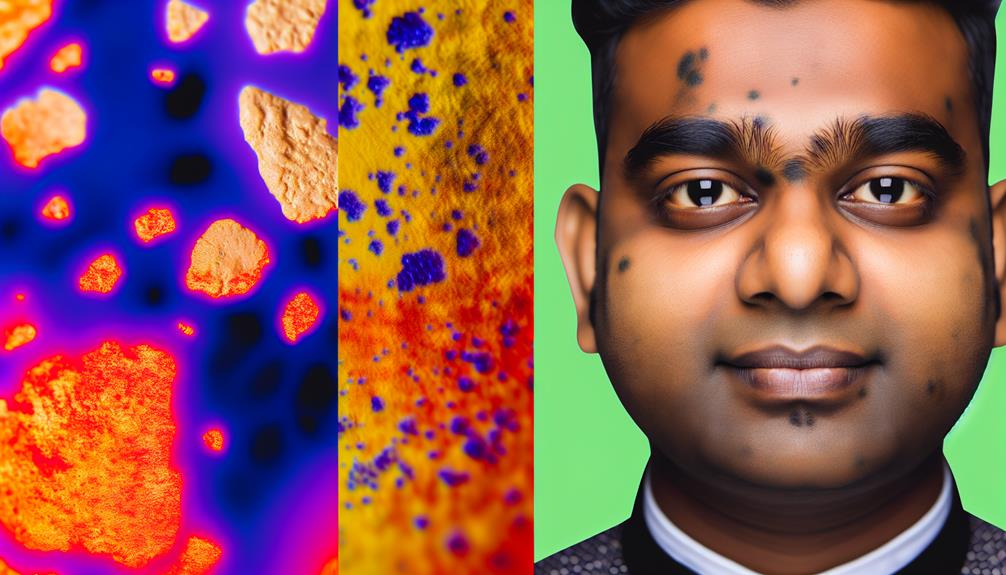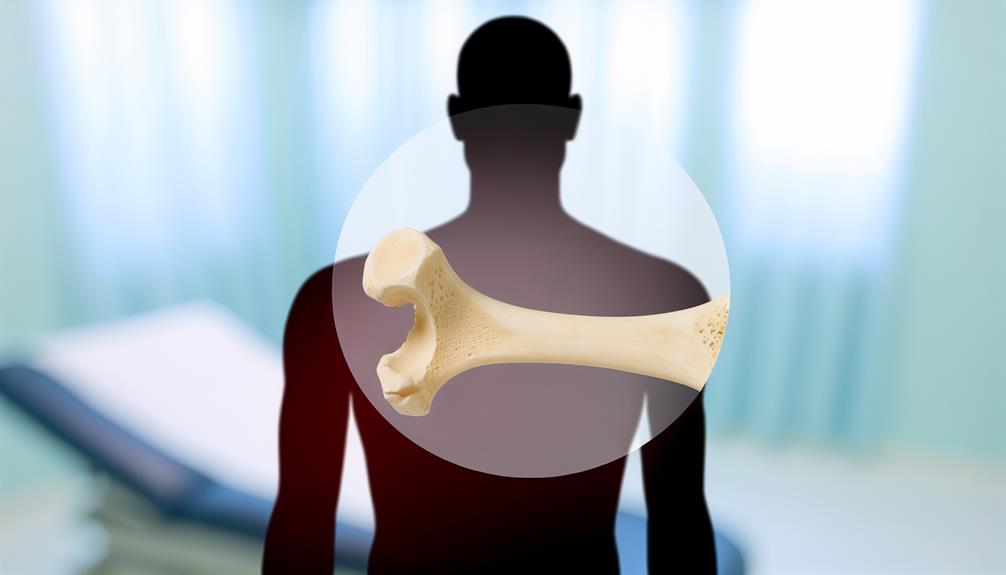If you're noticing signs of hormonal imbalance, you might experience decreased libido, unexplained fatigue, and mood swings. Weight gain or increased body hair can also occur, alongside skin changes and gynecomastia. Furthermore, issues like decreased bone density and low motivation may arise. These symptoms often stem from fluctuations in testosterone and cortisol levels. Understanding these signs is vital for recognizing underlying health issues. It's essential to consult a healthcare professional for proper evaluation and treatment options. By exploring this further, you'll better grasp how hormonal health impacts overall well-being.
Decreased Libido

Decreased libido can often signal underlying hormonal imbalances in men, revealing more than just a temporary dip in sexual desire. When I experience a reduction in my sexual interest, it's essential to reflect on the potential hormonal fluctuations affecting my testosterone levels. Testosterone plays a significant role in not just libido but also overall energy and mood.
In my analysis, I've found that relationship dynamics are frequently impacted by hormonal changes. A decrease in libido can create tension or misunderstandings between partners, leading to feelings of inadequacy or frustration. It's important to recognize that these emotional responses can stem from physiological changes rather than relational issues.
Exploring hormonal therapy can be a viable option if I discover that my decreased libido is connected to low testosterone levels. Hormonal therapy aims to restore balance, which might improve not only my sexual desire but also my overall well-being. However, it's imperative to approach this option with caution, as the effectiveness and side effects vary among individuals.
Unexplained Fatigue
When I experience unexplained fatigue, it's essential to reflect on hormonal imbalances as a potential cause. Understanding the common triggers, recognizing the specific symptoms, and exploring effective solutions can provide clarity and relief. Let's examine these factors in detail to better address this persistent issue.
Common Causes Explained
Unexplained fatigue can often be a perplexing symptom for men, signaling potential hormonal imbalances that warrant investigation. I've come to realize that various common causes can contribute to this fatigue, and understanding them is essential for addressing the issue effectively.
Several factors can play a role in this hormonal disruption, including:
- Stress factors: Chronic stress can elevate cortisol levels, leading to fatigue and decreased energy.
- Dietary influences: Poor nutrition or imbalanced diets can impact hormone production, affecting overall vitality.
- Sleep deprivation: Insufficient restorative sleep can exacerbate feelings of fatigue and disrupt hormonal balance.
- Sedentary lifestyle: Lack of physical activity may contribute to decreased testosterone levels, resulting in increased tiredness.
Recognizing these underlying causes is important for anyone experiencing unexplained fatigue. By identifying and addressing stress factors, optimizing dietary influences, ensuring adequate sleep, and incorporating regular exercise, we can take significant steps toward restoring hormonal balance. If you find yourself struggling with persistent fatigue, it's worth reflecting on these aspects to uncover potential solutions. It's a journey worth starting to reclaim your energy and overall well-being.
Symptoms to Recognize
Often, I notice that men experiencing unexplained fatigue may overlook other accompanying symptoms that signal a potential hormonal imbalance. This fatigue isn't just about feeling tired; it can manifest as a significant drop in energy levels, decreased motivation, and even mood fluctuations. These symptoms can be indicative of underlying hormonal issues, particularly relating to testosterone levels.
When evaluating unexplained fatigue, I recommend considering hormonal testing. This testing can provide insight into whether hormonal deficiencies or imbalances are at play. Low testosterone can lead to a cascade of other symptoms, including diminished libido, irritability, and difficulty concentrating. It's essential to take a holistic view; the fatigue might be a symptom of a more complex hormonal disruption.
Moreover, lifestyle adjustments can play a pivotal role in managing these symptoms. Regular exercise, a balanced diet, and adequate sleep can help mitigate some of the fatigue experienced. Recognizing these interconnected symptoms not only aids in identifying hormonal imbalances but also emphasizes the importance of a proactive approach to overall health. Ignoring these signs can lead to prolonged discomfort and affect quality of life.
Solutions and Treatments
Addressing unexplained fatigue requires a multifaceted approach that targets the underlying hormonal imbalances. I've found that it's essential to take into account various strategies, as no single solution applies universally. Here's what I recommend for a more balanced state:
- Hormone therapy: Consulting with a healthcare provider about potential hormone replacement options can help restore balance.
- Lifestyle changes: Small adjustments, like reducing alcohol intake and quitting smoking, can greatly impact energy levels.
- Exercise routines: Engaging in regular physical activity not only boosts energy but also enhances mood, supporting hormonal health.
- Stress management and sleep hygiene: Prioritizing relaxation techniques such as meditation or yoga can improve sleep quality, which is critical for recovery.
Additionally, dietary adjustments and the incorporation of herbal supplements may provide further support. Regular check-ups and medical consultations are essential to monitor hormonal levels and adapt treatment plans as needed. Ultimately, a holistic approach that combines these elements can lead to a more sustainable solution for unexplained fatigue, allowing for improved energy and overall well-being.
Mood Swings

One of the notable signs of hormonal imbalance in men is the presence of mood swings, which can occur with surprising frequency. These fluctuations often stem from disruptions in hormonal levels, particularly testosterone. I've noticed that these mood swings can greatly affect emotional regulation and stress management, leading to challenges in personal and professional relationships.
To illustrate the impact of mood swings, I've created the following table highlighting potential effects and corresponding coping strategies:
| Impact | Coping Strategy |
|---|---|
| Relationship impacts | Improve communication skills |
| Increased irritability | Practice mindfulness practices |
| Difficulty in stress management | Implement lifestyle changes |
| Emotional volatility | Seek social support |
In my experience, it's essential to address these mood changes proactively. Utilizing self-care techniques, such as regular exercise and balanced nutrition, can help stabilize emotional responses. Additionally, exploring therapy options can provide important tools for managing these swings effectively.
Engaging in mindfulness practices not only aids in emotional regulation but also enhances overall well-being. Developing strong communication skills is crucial; it helps articulate feelings, reducing misunderstandings in relationships. Finally, establishing a reliable social support network can offer the encouragement needed during tough times.
Weight Gain
Weight gain can be a significant indicator of hormonal imbalance in men, particularly when it occurs unexpectedly or without changes in diet or physical activity. As I've observed, fluctuations in hormones like testosterone and cortisol can profoundly impact body composition. It's essential to understand that various factors may contribute to this weight gain, and addressing them can lead to effective management.
Here are some key considerations:
- Metabolic factors: Hormonal imbalances can alter how your body processes energy, leading to increased fat storage.
- Nutritional deficiencies: A lack of essential nutrients may disrupt hormone production, further complicating weight management.
- Stress management: Elevated stress levels often correlate with increased cortisol, which can promote weight gain, especially around the abdomen.
- Sleep quality: Poor sleep can disrupt hormonal regulation and metabolism, making it harder to maintain a healthy weight.
If you're experiencing unexpected weight gain, it's prudent to undergo hormonal testing to identify any imbalances. Lifestyle adjustments, such as refining dietary changes and exercise routines, are critical in addressing these issues. Additionally, recognizing age-related shifts can help contextualize these changes. By taking a thorough approach that includes stress management and improving sleep quality, you can work towards restoring balance and achieving a healthier body composition. Understanding these elements will empower you to make informed decisions about your health.
Increased Body Hair
I've observed that increased body hair can be a significant indicator of hormonal imbalance in men, often linked to elevated testosterone levels or other underlying health issues. Understanding the causes and health implications of excess hair growth is essential for effective management and potential remedies. Let's examine these aspects to better comprehend this phenomenon and its broader implications.
Causes of Excess Hair
Experiencing increased body hair can be a perplexing issue for many men, often rooted in hormonal imbalances. It's essential to understand the multifaceted causes behind this condition. Several factors can contribute to the production of excess hair, primarily involving hormonal, genetic, and environmental influences.
- Genetic factors: Family history can play a significant role in hair growth patterns.
- Hormonal therapies: Certain treatments may inadvertently increase androgen levels, leading to more body hair.
- Dietary influences: Nutritional choices can affect hormone production and metabolism, potentially exacerbating hair growth.
- Lifestyle choices: Factors such as stress levels and exercise habits can impact hormonal balance.
Additionally, endocrine disruptions from environmental toxins or age-related changes can further complicate matters. Medication effects and metabolic issues may also contribute to the overproduction of body hair. Understanding these underlying causes is essential for addressing the issue effectively. By identifying the specific contributing factors, one can take targeted actions to manage and potentially reduce excess hair growth. It's important to consult with a healthcare professional to explore potential solutions tailored to individual circumstances.
Health Implications Explored
Increased body hair can signal a range of health implications that warrant careful consideration. As I explore this topic, I find it essential to recognize how hormonal imbalances, particularly elevated testosterone levels, can contribute to excessive hair growth. This condition, known as hirsutism, often stems from underlying issues such as polycystic ovary syndrome (PCOS) or adrenal gland disorders in men.
I've noticed that lifestyle factors, such as diet and physical activity, can also influence hormonal levels and, consequently, body hair. For instance, a sedentary lifestyle and poor nutrition may exacerbate hormonal imbalances, leading to further complications. It's important to approach this issue holistically.
Hormonal testing becomes a critical tool in identifying the root cause of increased body hair. By analyzing hormone levels, I can better understand whether there's an overproduction of androgens or other hormonal irregularities at play. By correlating these test results with lifestyle factors, I can develop a more thorough view of my health status. Addressing increased body hair isn't just about aesthetics; it's a potential indicator of broader hormonal health issues that shouldn't be overlooked.
Management and Remedies
Managing increased body hair effectively requires a multifaceted approach that addresses both the symptoms and underlying hormonal imbalances. I've found that integrating various strategies can notably improve outcomes. Here's what I recommend:
- Dietary adjustments: Incorporate foods rich in antioxidants and healthy fats to support hormonal balance.
- Exercise routines: Regular physical activity can help regulate hormones and improve overall wellbeing.
- Stress management: Techniques such as mindfulness and deep breathing exercises can mitigate stress, which often exacerbates hormonal issues.
- Herbal remedies: Certain herbs have been shown to help balance hormones and reduce excessive hair growth.
In addition to these strategies, I've explored medical interventions like hormone therapy and nutritional supplements tailored to individual needs. Sleep hygiene is essential; quality sleep aids in hormone regulation. Additionally, considering acupuncture benefits can provide further support for hormonal balance. Lifestyle changes, such as limiting alcohol and prioritizing hydration, can also contribute to improved management of increased body hair. By approaching this issue holistically, it's possible to achieve meaningful results and enhance overall quality of life.
Reduced Muscle Mass
Reduced muscle mass can be a notable indicator of hormonal imbalance in men, often manifesting as a decline in strength and physical performance. As I've observed, testosterone plays an essential role in maintaining muscle mass and body composition. When testosterone levels drop, particularly due to age factors or other hormonal imbalances, it can lead to a noticeable reduction in muscle mass.
To address this issue, I recommend considering testosterone therapy, which may help restore ideal hormone levels and improve muscle development. However, it's essential to combine this approach with resistance training, as this type of exercise considerably stimulates muscle growth and improves physical performance. Tailoring exercise regimens to include a variety of resistance training routines can enhance results.
Moreover, nutrition adjustments are critical. Ensuring adequate protein intake and overall balanced nutrition can support muscle repair and growth. Lifestyle changes, such as incorporating stress management techniques, can also play a key role since elevated stress levels can negatively impact hormonal balance.
In my experience, regular hormonal testing is beneficial for monitoring testosterone levels and understanding individual body composition changes. This data can guide personalized recovery strategies that promote better muscle retention and growth. By focusing on these interconnected elements—testosterone levels, exercise, nutrition, and stress management—I believe it's possible to counteract reduced muscle mass effectively. Ultimately, addressing hormonal imbalance requires a thorough approach, acknowledging that each factor contributes considerably to overall physical health and performance.
Sleep Disturbances
Sleep disturbances can be a significant sign of hormonal imbalance in men, often linked to fluctuations in testosterone and cortisol levels. As I've explored this issue, I've noticed how these hormonal cycles can profoundly affect sleep quality. For instance, elevated cortisol levels due to stress impact not only how quickly I fall asleep but also how restful my sleep truly is.
Several factors contribute to sleep disturbances in men facing hormonal imbalances:
- Age Effects: As men age, hormonal shifts can lead to increased sleep disturbances, including conditions like sleep apnea.
- Lifestyle Factors: Poor diet, lack of exercise, and irregular sleep routines can exacerbate hormonal fluctuations.
- Environmental Influences: Things like noise, light, and temperature can disrupt sleep patterns and worsen overall sleep quality.
- Relaxation Techniques: Incorporating methods such as deep breathing or meditation can help mitigate stress and improve sleep.
It's essential to recognize that hormonal imbalances may require addressing both the physiological and psychological aspects. In my experience, establishing consistent sleep routines can make a difference. Additionally, I've found that sometimes, sleep aids can be beneficial, but they should be used judiciously. By understanding the interplay between hormones and sleep, I can better manage my sleep disturbances and enhance my overall health.
Memory Issues
Noticing even slight memory issues can be a telling indicator of hormonal imbalance in men, particularly connected to changes in testosterone and other hormones. I've found that cognitive decline often correlates with fluctuations in these hormone levels. It's vital to understand how hormonal shifts can affect our brain function and memory.
Here's a quick look at how memory issues manifest and their potential connection to hormonal changes:
| Memory Issue | Possible Cause | Suggested Action |
|---|---|---|
| Forgetfulness | Low testosterone | Consult a healthcare provider for hormone therapy. |
| Difficulty focusing | Elevated cortisol levels | Stress management techniques may help. |
| Short-term memory loss | Hormonal fluctuations | Regular check-ups to monitor hormone levels. |
When I started experiencing forgetfulness and difficulty concentrating, I realized it wasn't just part of aging. The evidence suggested that my hormonal balance was off. Hormone therapy can potentially address these issues, offering a pathway to improve cognitive function. However, it's essential to approach this with a healthcare professional, as they can provide tailored advice based on individual needs.
Hot Flashes

Hot flashes can be an unexpected and uncomfortable experience for men, often stemming from hormonal imbalances, particularly involving testosterone and estrogen levels. I didn't realize how much these fluctuations could affect my daily life until I started experiencing sudden waves of heat, often accompanied by sweating and discomfort. It can be perplexing, leaving one questioning if it's just a normal aging process or something more substantial.
Understanding the underlying causes is essential. Hormonal changes, particularly a decrease in testosterone, can lead to an increase in estrogen relative to testosterone, triggering these hot flashes. Here are some factors that may contribute:
- Age-related hormonal decline: Natural changes in hormone production as I get older.
- Stress levels: High stress can exacerbate hormonal imbalances, increasing the likelihood of hot flashes.
- Obesity: Excess body fat can convert testosterone into estrogen, potentially leading to imbalances.
- Medical conditions: Certain health issues or medications can affect hormone levels.
For those of us experiencing hot flashes, exploring options like hormone therapy may be beneficial. It can help restore balance and alleviate symptoms. Additionally, making lifestyle changes can provide relief. Regular exercise, a balanced diet, and stress management techniques can greatly impact overall hormonal health. By addressing these factors proactively, I've found that it's possible to manage hot flashes more effectively, leading to an improved quality of life.
Changes in Appetite
Hormonal imbalances can also manifest through noticeable changes in appetite. I've observed that many men experience appetite fluctuations that can be attributed to various hormonal triggers. For instance, testosterone levels can greatly influence one's desire to eat. When testosterone dips, it can lead to a decrease in appetite, while surges may result in an increased craving for food. Understanding these patterns is essential for recognizing potential hormonal issues.
In my experience, it's not just about feeling hungrier or less hungry; it's the nature of cravings that often shifts. Some men may find themselves drawn to unhealthy foods or experience sudden urges for specific types of meals. This behavior could be a direct response to hormonal changes, rather than mere willpower or lifestyle choices.
Here's a quick overview of the common appetite fluctuations associated with hormonal imbalances:
| Appetite Changes | Possible Hormonal Trigger |
|---|---|
| Increased appetite | Elevated testosterone |
| Decreased appetite | Low testosterone |
| Craving specific foods | Fluctuating cortisol |
| Irregular eating patterns | Thyroid hormone imbalances |
Recognizing these changes can be the first step in addressing potential hormonal imbalances. If you notice consistent appetite fluctuations or unusual cravings, it might be worth consulting a healthcare professional. Understanding the underlying hormonal triggers can lead to more effective management strategies for maintaining a balanced diet and overall wellness.
Skin Changes

Skin changes can serve as a significant indicator of hormonal imbalances in men. It's fascinating how our skin can reflect internal hormonal shifts, signaling issues that may need attention. For instance, fluctuations in testosterone levels can lead to noticeable changes such as increased acne outbreaks or a decline in skin elasticity. As I've observed, these symptoms aren't just cosmetic—they can indicate deeper hormonal dysregulation.
When analyzing skin changes, several specific signs can point to hormonal imbalances:
- Acne outbreaks: An increase in oil production, often linked to testosterone spikes, can lead to persistent acne.
- Dry or flaky skin: A decrease in hormones like testosterone can reduce moisture retention, resulting in dry skin.
- Loss of skin elasticity: As testosterone levels drop, I've noticed a decrease in collagen production, which can lead to sagging skin.
- Unusual hair growth: Hormonal imbalances may cause increased body hair or even hair loss on the scalp.
These changes can be alarming, but they're vital clues in understanding one's hormonal health. If I notice any of these symptoms, I consider consulting a healthcare provider for a thorough evaluation. Addressing the underlying hormonal issues can not only improve skin health but also enhance overall well-being. Remember, our skin often tells a story—it's essential to listen to it.
Gynecomastia
Gynecomastia, characterized by the enlargement of breast tissue in men, often signals underlying hormonal imbalances. In my analysis, I find that various factors, including hormonal fluctuations and certain medications, can contribute to its development. Understanding the causes and available treatment options is essential for effectively addressing this condition.
Causes of Gynecomastia
Experiencing a shift in hormonal balance can lead to various physiological changes, one of which is gynecomastia, characterized by the enlargement of breast tissue in men. This condition often stems from an imbalance between estrogen and testosterone levels, resulting in excess breast tissue. Understanding the causes can be vital for addressing the issue appropriately.
Several factors can contribute to this hormonal imbalance:
- Hormonal therapy: Medications such as androgens or anabolic steroids may disrupt natural hormone levels, leading to gynecomastia.
- Obesity: Increased body fat can elevate estrogen production, exacerbating the imbalance.
- Aging: As men age, testosterone levels naturally decline, potentially allowing estrogen's effects to become more pronounced.
- Medical conditions: Conditions like hyperthyroidism or liver disease can also alter hormone levels, triggering gynecomastia.
Recognizing these underlying causes is essential for anyone experiencing changes in breast tissue. In some cases, lifestyle changes, such as weight management and exercise, can help mitigate this condition. However, the role of hormonal therapy should be carefully evaluated under medical supervision. Understanding these factors can guide us towards effective management strategies.
Treatment Options Available
Addressing the complexities of gynecomastia requires a thorough understanding of the available treatment options. It's essential to contemplate a wide-ranging approach that includes lifestyle modifications, nutritional support, and therapeutic interventions.
The first step often involves a medical evaluation to determine the underlying cause. Following this, I can explore various treatment options tailored to individual needs:
| Treatment Option | Description |
|---|---|
| Lifestyle Modifications | Adjusting diet and reducing alcohol intake. |
| Nutritional Support | Incorporating a balanced diet rich in essential nutrients. |
| Hormone Therapy | Utilizing medications to regulate hormonal levels. |
| Exercise Regimen | Engaging in regular physical activity to improve overall health. |
| Herbal Supplements | Exploring natural remedies to support hormonal balance. |
Stress management is also critical; I need to incorporate techniques like mindfulness or yoga. Patient education guarantees I'm informed about preventative measures and potential outcomes. By utilizing this multi-faceted approach, I can effectively manage gynecomastia and improve my quality of life.
Decreased Bone Density

Many men may not realize that decreased bone density can be a significant sign of hormonal imbalance, particularly related to declining testosterone levels. As these levels drop, the risk of developing osteoporosis increases, leading to fragile bones and heightened susceptibility to fractures. It's essential to recognize the symptoms associated with decreased bone density early on, as early intervention can prevent further complications.
Here are some key indicators that may suggest decreased bone density due to hormonal imbalance:
- Frequent fractures: Experiencing breaks from minor falls or injuries can indicate weakened bones.
- Loss of height: A noticeable decrease in stature may signal spinal compression fractures.
- Back pain: Chronic pain, especially in the lower back, can arise from deteriorating vertebral bones.
- Posture changes: A stooped or hunched posture often reflects underlying bone density issues.
If you're experiencing any of these signs, it's essential to consult a healthcare professional. They may recommend tests to assess bone density and evaluate hormone levels. Hormonal therapy can be an effective treatment to restore testosterone levels, which may help improve bone density and reduce the osteoporosis risk. By understanding the implications of hormonal imbalances on bone health, you can take proactive steps to safeguard your well-being. Remember, taking action early can make a significant difference in maintaining your bone health and overall quality of life.
Low Motivation
When I notice low motivation, it's often linked to decreased energy levels, a lack of interest in activities I once enjoyed, and difficulty concentrating. These symptoms can indicate an underlying hormonal imbalance that warrants attention. Understanding these connections is essential for addressing the root causes effectively.
Decreased Energy Levels
Decreased energy levels can often signal an underlying hormonal imbalance in men. When I notice a drop in my energy, it's essential to evaluate various factors that may be at play. Hormones like testosterone can greatly impact how energized I feel. Consequently, I often explore several strategies to combat this issue:
- Nutritional balance: Ensuring I consume a diet rich in essential nutrients can help stabilize hormones.
- Exercise routines: Regular physical activity is crucial; it boosts energy and enhances mood.
- Sleep hygiene: Prioritizing quality sleep is non-negotiable for maintaining peak hormone levels.
- Stress management: Implementing relaxation techniques reduces cortisol levels, which can otherwise drain my energy.
In addition to these lifestyle changes, I sometimes contemplate energy supplements or herbal remedies to support my overall vitality. However, I always consult with a healthcare professional before starting any new regimen. Hormonal testing may also be significant to pinpoint specific imbalances. By addressing hydration levels and maintaining a consistent routine, I can effectively manage my energy levels and overall well-being.
Lack of Interest
Feeling a drop in energy often leads to a noticeable lack of interest in activities that once brought joy or motivation. This phenomenon, often linked to hormonal imbalances, can greatly affect my emotional health. When my testosterone levels decline, I may find myself disengaged from hobbies, friendships, and even my professional responsibilities. This lack of interest isn't just a personal issue; it can have a profound relationship impact.
As I become less involved, my interactions with loved ones may suffer, leading to misunderstandings and feelings of isolation. I might miss out on quality time with my partner or neglect important social engagements. This withdrawal can create a vicious cycle where the emotional strain from strained relationships further exacerbates my lack of interest, trapping me in a downward spiral.
Identifying this symptom is essential. It signals that my body may be out of balance, urging me to seek medical advice. Addressing hormonal issues can restore not only my enthusiasm for life but also improve my emotional health and strengthen my relationships. Recognizing these signs early can lead to effective interventions and a more fulfilling life overall.
Difficulty Concentrating
One of the most striking signs of hormonal imbalance in men is difficulty concentrating, often accompanied by low motivation. I've experienced moments where my cognitive function seemed impaired, making it challenging to focus on tasks that once felt effortless. This decline in mental clarity can be frustrating and disheartening.
Several factors contribute to this phenomenon:
- Testosterone Levels: Low testosterone can greatly impact cognitive abilities, leading to issues with focus.
- Stress Hormones: Elevated cortisol levels can create a foggy mind, hindering concentration.
- Sleep Quality: Hormonal imbalances often disrupt sleep patterns, further diminishing mental clarity.
- Diet and Nutrition: Poor nutrition can exacerbate hormonal issues, affecting overall cognitive function.
If you're grappling with these symptoms, it's essential to reflect on the underlying hormonal factors. Addressing them may not only enhance your cognitive function but also improve your motivation. Seeking professional advice and adopting lifestyle changes can lead to considerable improvements in how you feel and perform daily. Recognizing these signs early on is vital for regaining control over your mental acuity and overall well-being.
Frequently Asked Questions
What Are the Common Causes of Hormonal Imbalance in Men?
When I think about the common causes of hormonal imbalance in men, I notice stress factors play a significant role. Chronic stress can disrupt hormone levels, affecting everything from mood to metabolism. Additionally, I've observed that diet impact cannot be overlooked; poor nutrition can lead to deficiencies that further exacerbate hormonal issues. By addressing these factors, I believe we can gain better control over our hormonal health and overall well-being.
Can Lifestyle Changes Help Restore Hormonal Balance?
Absolutely, lifestyle changes can greatly help restore hormonal balance. I've noticed that regular exercise has a profound impact; it not only boosts testosterone levels but also enhances overall well-being. Additionally, I've found that my diet has an essential influence—incorporating healthy fats and reducing processed sugars can make a difference. By focusing on these aspects, I've been able to improve my hormonal health, leading to better energy levels and mood stability.
How Is Hormonal Imbalance Diagnosed in Men?
When diagnosing hormonal imbalance in men, I typically start with blood tests to measure hormone levels. These tests can reveal discrepancies in testosterone, estrogen, and other hormones. Additionally, I recommend symptom tracking, where I monitor changes in energy, mood, and libido. By combining these approaches, I can identify potential imbalances more accurately and develop a tailored plan to address them. It's essential to understand the underlying factors contributing to these symptoms.
Are There Natural Supplements That Can Help With Hormonal Balance?
So, you're wondering if natural supplements can fix all your hormonal woes, huh? Well, while I can't promise you'll sprout muscles overnight, herbal remedies like ashwagandha and dietary adjustments can indeed help. These options may support hormonal balance by reducing stress or enhancing overall nutrition. Just remember, I'm not a wizard; it's always wise to consult a healthcare professional before diving headfirst into any supplement regimen. Balance is key, after all!
When Should I See a Doctor for Hormonal Imbalance Symptoms?
When I experience symptoms of hormonal imbalance, I consider the severity of those symptoms. If they persist or greatly impact my daily life, it's definitely time to see a doctor. I want to explore treatment options tailored to my specific situation. It's essential to get a proper diagnosis to understand the underlying causes and guarantee I receive the most effective care. Don't hesitate to seek professional help if things feel off.
